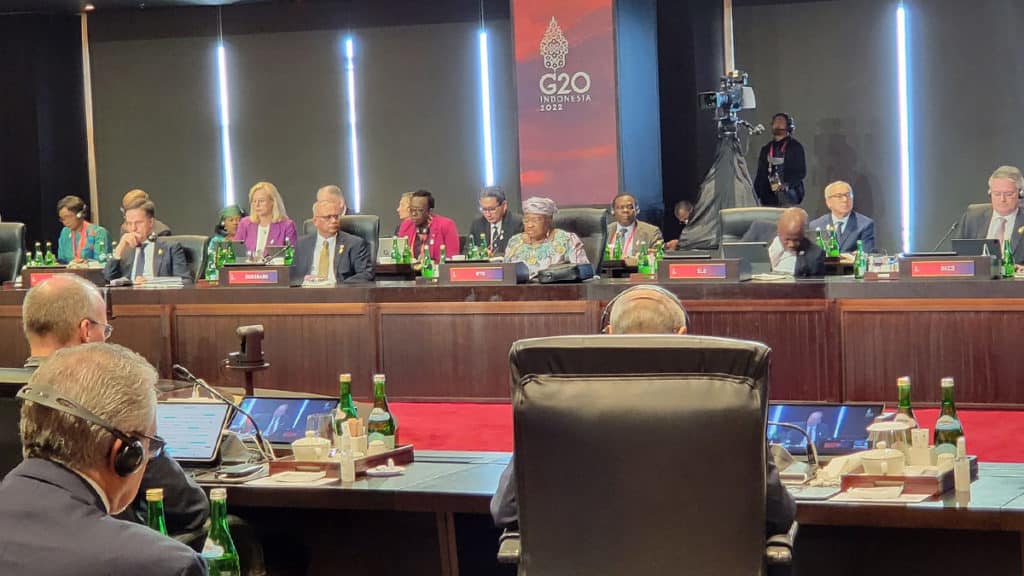La DG Okonjo-Iweala a los dirigentes del G20: “Tenemos que fortalecer la cooperación comercial, no debilitarla”

La Directora General Okonjo-Iweala hizo un firme llamamiento a los dirigentes del G20 para evitar la fragmentación del comercio y levantar las restricciones a la exportación de alimentos, piensos y abonos. Hizo uso de la palabra en la Cumbre anual de Jefes de Estado y de Gobierno del G20 celebrada en Bali (Indonesia) los días 15 y 16 de noviembre.
(de momento sólo en inglés)
«An open rule-based world trading system is the foundation of our global economy,» the Director-General told the G20 leaders at the opening of the summit. «It has delivered unprecedented growth and development. It has enabled us to withstand the COVID-19 pandemic. And it will be key to achieving the ambitious goals you have set solving food and energy shortages, tackling climate change, financing development and getting the (UN Sustainable Development Goals) back on track.»
«Fragmenting this foundation would put these goals in jeopardy, worsening domestic prospects and geopolitical tension,» she added. «It would result in substantial global GDP losses, which could be double digit losses for developing countries.»
While the concept of «strategic competition» is a factor among today’s global challenges, «we also know that strategic cooperation is key to tackling many of the same challenges. Therefore, we need to strengthen trade cooperation, not weaken it.»
According to a WTO Secretariat note issued last April, the breakdown of the global economy into rival trading blocs could reduce GDP in the long run by about 5 per cent, notably by restricting competition and stifling innovation.
The Director-General urged G20 leaders to lift export restrictions on food, feed and fertilizers, noting that the number of such restrictions have been increasing, with the world’s poorest suffering most from such policies. According to WTO estimates, of the 54 export restrictions currently in place, more than 40 per cent have been imposed by G20 economies, the DG noted.
«Please set an example, as some of you are beginning to do,» she told leaders. With regards to fertilizers in particular, «we are all worried, especially for Africa, which consumes only 3 to 4 per cent of the world’s fertilizer supplies.»
The Director-General told G20 leaders that it was important that poor, debt-distress countries be supported through more open trade and increased output. She noted that a new joint study by the WTO and the UN Food and Agriculture Organization recommends, among other things, consideration of fertilizer contract swaps in favour of poor countries.
The G20 leaders issued a Bali Declaration at the conclusion of the summit on 16 November. The Director-General said she was «pleased that the G20 communiqué was prominent in terms of highlighting trade issues and issues of concern to the WTO such as agriculture, export restrictions on food, and WTO reform.»
The G20 leaders’ communiqué reaffirms the group’s commitment to a rules-based, non-discriminatory, free, fair, open, inclusive, equitable, sustainable and transparent multilateral trading system, with the WTO at its core. Leaders also agreed that reforming the WTO is key in strengthening trust in the multilateral trading system.
The G20 leaders highlighted the importance of allowing agriculture and food trade to flow smoothly and reaffirmed the need to update global agricultural food trade rules and to facilitate trade in agricultural and food products. They cited the importance of not imposing export prohibitions or restrictions on food and fertilizers in a manner inconsistent with relevant WTO provisions.
The G20 leaders also committed to reinforce international trade and investment cooperation to address supply chain issues and avoid trade disruptions. They said trade and climate/environmental policies should be mutually supportive and WTO consistent and contribute to the objectives of sustainable development.
During her stay at the G20 summit, the Director-General engaged with world leaders such as Singapore’s Prime Minister Lee Hsien Loong, Chinese President Xi Jinping, South African President Cyril Ramaphosa, Indian Prime Minister Narendra Modi, Canadian Prime Minister Justin Trudeau, US President Joe Biden, UK Prime Minister Rishi Sunak, Italian Prime Minister Giorgia Meloni, European Commission President Ursula von der Leyen and Brazilian Foreign Minister Carlos França.















